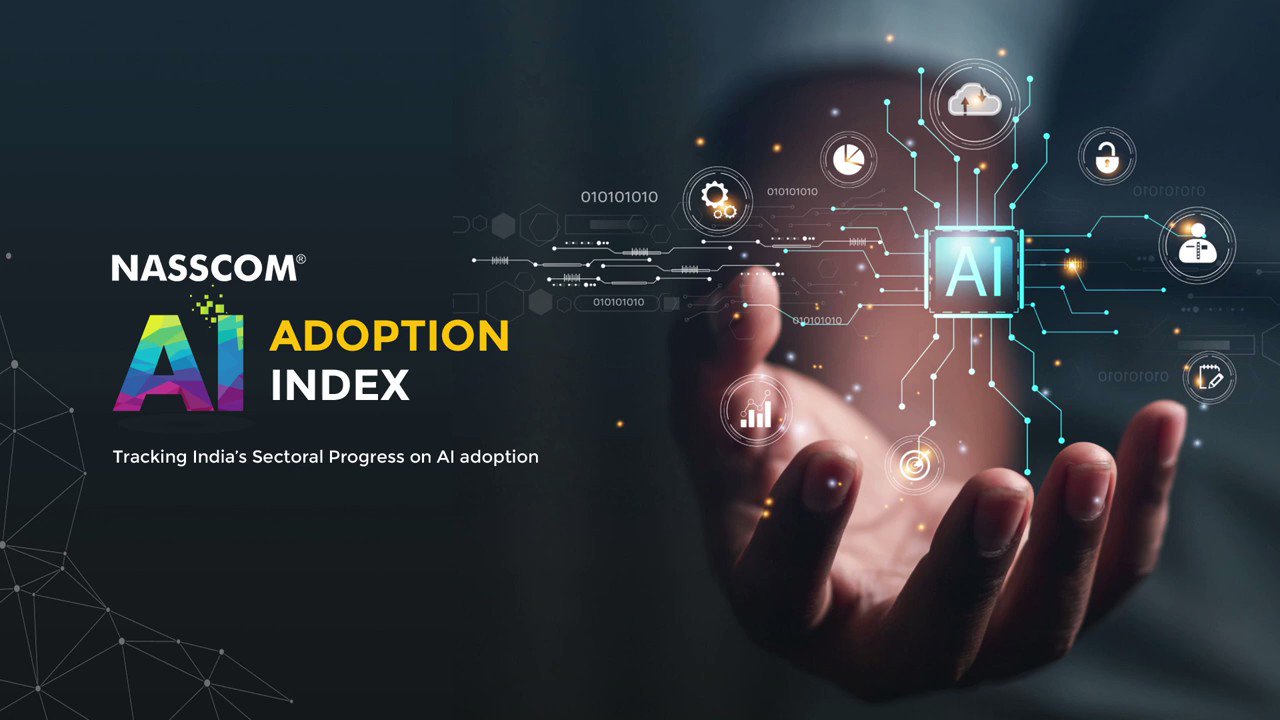The importance of Artificial Intelligence (AI) has accelerated manifolds over the last decade. Businesses are beginning to see its potential in transforming sectors and societies in ways previously unimagined. Tracking India’s sectoral progress on AI adoption, the National Association of Software and Services Companies (NASSCOM), along with EY and with support from Microsoft, EXL and Capgemini, has today launched a first of its kind “AI Adoption Index” for India. The index is the first detailed assessment of AI adoption trends in India, beginning with four key sectors (BFSI, CPG and Retail, Healthcare, and Industrials & Automotive) that could contribute ~60% of AI’s potential value-add of $450-500 bn to India’s GDP by 2025.
AI’s Primacy in Shaping India’s Techade
Global investments in AI have more than doubled over the last couple of years, from $36 Bn in 2020 to a high of $77 Bn in 2021. Though the current rate of AI investments in India is growing at a CAGR of 30.8% and poised to reach $881 Mn. by 2023, it will still represent just 2.5% of the total global AI investments of $340 Bn. This creates a massive opportunity for Indian enterprises to accelerate investments and adoption of AI to drive equitable growth across sectors. For India to achieve its $1 trillion GDP goal by FY2026-2027, it needs to have a strong correlation to the maturity of AI adoption.

Debjani Ghosh, President NASSCOM said, “AI’s true value in this Techade emerges from its ability to transition from technology potential to technology impact. The pandemic has made it absolutely time critical for organisations to move from data & technology silos to building specialised AI capabilities at scale across sectors combined with a structured data utilization strategy. The first of its kind AI Adoption Index will not only provide the necessary benchmark for organisations on AI maturity but will also help them take the key structural steps to realise AI’s potential to tangible national value.”
With rapid scaled digitalization, Indian enterprises have already embarked on their AI journey. Companies are moving from ‘no defined AI strategy’ and cost consideration to testing PoCs and implementing limited use-cases. As per the study, 65% of organisations have AI strategy defined either at a functional or enterprise level. Although process optimization continues to be the primary driver of AI adoption amongst organisations, there is a rising focus on achieving customer-centric goals leveraging AI as a tool for innovation and growth. Larger organizations are driving innovation with AI, helped by dedicated budgets, resources and alignment with broader objectives.
India a Global Hub for AI Talent
With a burgeoning number of STEM graduates and digital natives, India is one of the biggest talent hubs for AI. India currently is the 2nd largest global hub in training and hiring AI talent. However, rapid growth in AI applications has led to a surge in hiring for AI professionals. While the talent pipeline has grown over past two years, rapid jump in talent demand has caused a supply demand gap. Firms are increasingly relying on contracting and Gig models while focusing on building internal AI talent through reskilling and upskilling. Organisations are also investing in research talent in specific academic institutions of eminence. As per the study findings, 44% of businesses already have a dedicated or a cross-functional AI team structure, while 25% rely fully on outsourcing as their primary source for AI talent.. Efforts from the government policies and collaboration with academia on STEM education is also helping reduce the current demand supply gap.
Specialized Sector-Focused AI Strategy Key to Diversify Growth
Top sectors such as BFSI, Retail, Healthcare and Industrial & Automotive seem to converge on overall AI maturity, but greatly diverge in the choices, suggesting the need for sector-specific AI strategies ahead. While a traditionally laggard sector in AI adoption, such as Industrial & Automotive, is gearing momentum with focus on AI PoC-to-production, use of AI for operational optimisation, and Cloud investments, sectors such as BFSI and Retail have pinned expansion, transitioning to modern systems, data standardization model, and innovation at the core of their AI initiatives to improve customer experience and reduce operational costs using AI. However, for a data-intensive sector such as Healthcare, that can benefit immensely by shifting to AI-led preventive healthcare strategies, there is a massive need for AI advocacy and RoI demonstration to realise its full potential. India’s healthcare market has grown 3X+ from $110 bn. in 2016 to $372 bn. in 2022, driven by increasing investments in cutting-edge healthcare technologies, from remote diagnostics to robotic surgeries, and preventive healthcare analytics. Use of AI in improving healthcare systems can potentially generate $25 bn. of economic value add for India by 2025.
Future outlook – Making AI Mature in India
The Indian enterprises today have established the foundation to scale their AI initiatives, with greater adoption of public/hybrid Cloud and data standards, building world-leading AI talent, and early adoption of Responsible AI models. However, for India to generate $500 Bn potential through AI and data, organisations need to move from data silos to build an effective data utilization strategy across the building blocks of data, technology stack, talent, and effective Lab-to-Market for value driven innovation.





